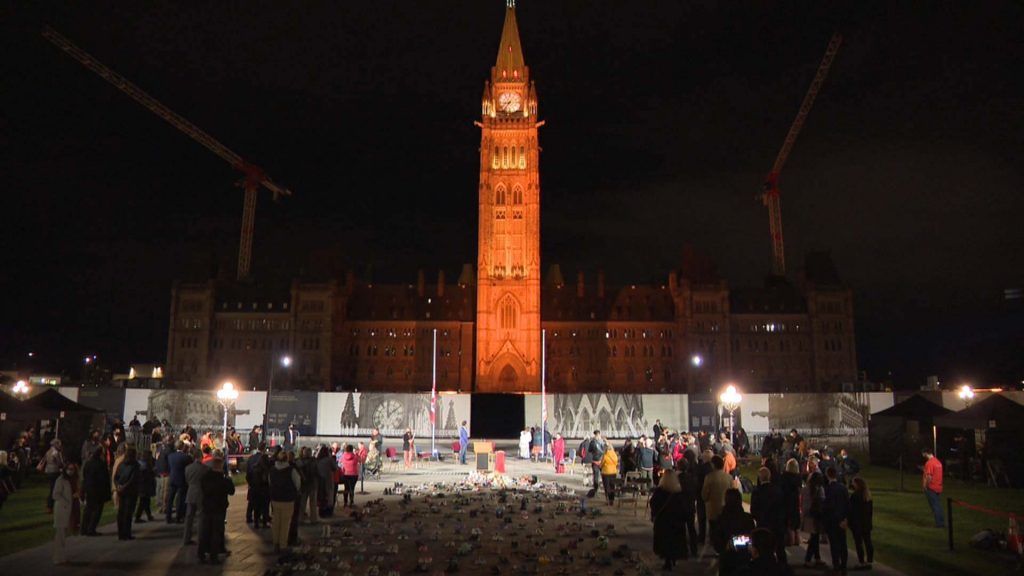
On Jan. 4, 2022, the Canadian government and class counsel representing First Nations plaintiffs announced they reached agreements in principle on compensation and long-term reform of First Nations child and family services and Jordan’s Principle systems.
It was said to be the largest class-action settlement in Canadian history — and possibly the world.
As a result, many people have questions, so APTN News has compiled a list of frequently asked questions for easy reference.
As of Jan. 14, 2022, certain questions simply can’t be answered. That’s because an agreement in principle is not the same thing as a legally binding final settlement agreement.
The parties plan to negotiate final details in the coming months.
Who are the parties?
The First Nations Child and Family Caring Society and Assembly of First Nations launched a complaint at the Canadian Human Rights Tribunal (CHRT) about these same issues in 2007.
The CHRT ordered Canada to pay $40,000 to victims of discrimination in 2019. The class action was filed separately in the same year but covered the same issues.
The agreements in principle aim resolve both the class action and CHRT complaint.
The class-action settlement, if approved, would overlap with the CHRT compensation decision. This would create a single, umbrella payout.
What has been agreed to?
Canada has agreed to pay $20 billion to First Nations people who the government has discriminated against by underfunding child and family services on reserves and in the Yukon.
An agreement worth $19.8 billion has been reached separately to reform these programs.
Has this case been settled?
Canada and counsel representing First Nations plaintiffs have signed an agreement in principle to settle the case, but it is not final.
A final settlement agreement will need to be approved by the Federal Court of Canada.
Once approved, the agreement and a plan to disburse payments to eligible people would be implemented.
There is no firm timeline.
Who is eligible?
Canada has agreed to compensate the following groups of people:
First Nations people removed from their homes on a reserve or in the Yukon between April 1, 1991 and March 31, 2022
First Nations people impacted by the government’s narrow definition of Jordan’s Principle between Dec. 12, 2007 and Nov. 2, 2017
First Nations people who did not receive or were delayed receiving an essential public service or product between April 1, 1991 and Dec. 11, 2007
Certain caregivers of children in the above groups will be eligible.
This is non-binding and not final.
How much money could I get?
This will be contained in the final agreement and has not been determined.
Canada has said children removed from their homes should get at least $40,000 and potentially more depending on certain factors. Primary caregivers of these children are expected to also get $40,000.
No one has publicly indicated how much money Jordan’s Principle claimants and others denied services could get.
How will payment be distributed and what information will I need?
This information will be in the final agreement and has not been released publicly yet.
The application process and payment plan will need to be filed and approved by the court.
Why aren’t Inuit and Métis included?
This case was launched over the federal government’s underfunding of the First Nations child and family services program.
This program was administered solely on First Nations reserves and in the Yukon. Inuit and Métis communities did not receive services through it.
Similarly, Inuit and Métis are not eligible to access Jordan’s Principle due to its connection with the Indian Act.
Are the Northwest Territories included?
First Nations children removed from their homes on reserves in Northwest Territories are not eligible because these communities did not receive services from the First Nations child and family services program but rather from the territorial government.
First Nations people in N.W.T. impacted by Canada’s refusal to obey Jordan’s Principle or denied public services may be eligible.
I am First Nations, was apprehended from my home, but lived off-reserve. Am I eligible?
Probably not. A different proposed class action has been filed on behalf of First Nations, Inuit and Métis children apprehended off reserve.
Learn more here: Walters and David v Her Majesty the Queen
I still have questions. Where can I learn more?
This class action is being litigated by Toronto-based law firm Sotos Class Actions. You can find an FAQ and register for updates on their website here: First Nations Youth Class Action.









